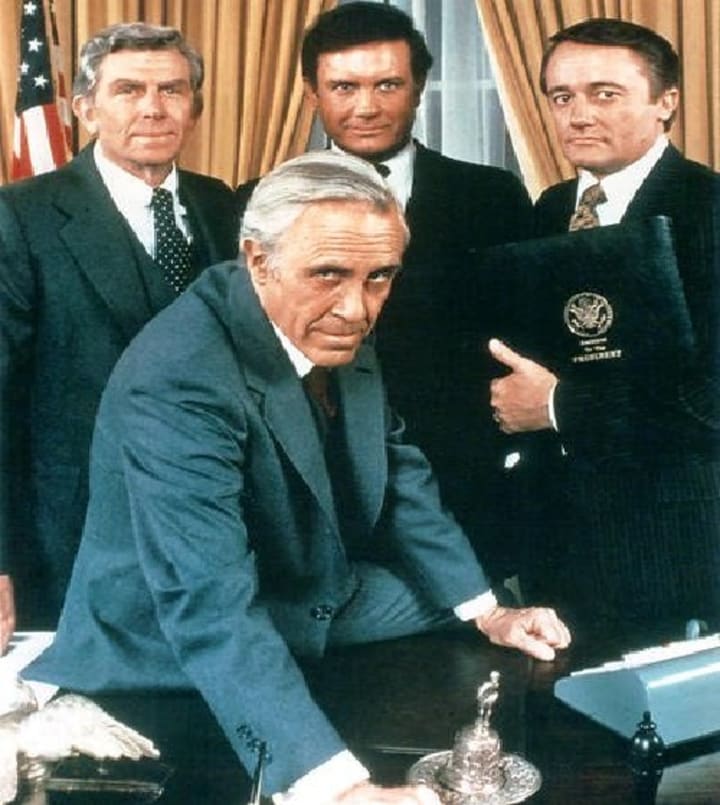Revisiting 'Washington: Behind Closed Doors'
A Look Back at the 1977 Miniseries that Fictionalized the Nixon White House

Before House of Cards, before The West Wing, there was Washington: Behind Closed Doors. Broadcast in six parts on the ABC network in 1977, it followed hot on the heels of its source novel, former Nixon aide John Ehrlichman's Roman à clef The Company(later republished under the miniseries' title). The result is an intriguing blend of fact and fiction.
Indeed, half the fun of watching the series lies in that mixture. For a history buff such as myself, part of what interested me in the series was knowing that it was the sort-of inside story of the Nixon years from one of those who had been there. As a result, it's fun to sit there trying to figure out who is who and see how they portray events that were—in 1977 at least—still fresh in the memories of viewers. Some are obvious, such as Jason Robards's character Richard Monckton being Nixon and Robert Vaughan's Frank Flaherty being a stand-in for Nixon's longtime Chief of Staff Bob Hadelman. Or to see how things like the Vietnam War (always alluded to in the series as "the war in Southeast Asia") and events like Nixon's impromptu visit to a protestor camp at the Lincoln Memorial play out. Portions of the narrative are undoubtedly fiction (such as a large portion of the climax involving Monckton and CIA Director Bill Martin) but, for all six episodes, the mixture of fact and fiction is intriguing.
It's a chance to see, in fiction at least, how Washington politics of yesteryear played out. Perhaps surprisingly, given the changes in technology and the news cycle, things haven't changed as much in the last four decades as one might think. The plotline of the miniseries with its focuses on the abuses of power, money in political campaigns, and the collision of the intelligence community with the White House all feel remarkably fresh even after four decades. That is something further helped by the direction of Gary Nelson, whose choices include precursors to The West Wing's famous "walk and talk" sequences. Perhaps it just proves the adage of how "the more things change, the more they stay the same?"

The Men in Power "Behind Closed Doors": Jason Robards as President Monckton with Andy Griffith as President Esker Anderson, Cliff Robertson as CIA Director Bill Martin, and Robert Vaughan as White House Chief of Staff Frank Flaherty
As with many miniseries of the era and subsequently, another part of watching it is the large cast of characters with interweaving plotlines. Cliff Robertson gets top billing and plenty of screen time as CIA Director Bill Martin who finds himself caught in the crosshairs of not just the President but two women in his life vying for his attention. Perhaps the real stars of the miniseries are Robards as the Nixon-like Monckton and Vaughan as his right-hand man Flaherty. Robards wonderfully captures and brings to life a version of Nixon as an insecure man running for office in part due to a deep insecurity that manifests itself in fits of anger at the press or political opponents and in part due to a lust for power while Vaughan portrays an icy coolness that never quite reaches a boiling point. Appearing in early episodes of the miniseries in a surprising turn is Andy Griffith as the Lyndon Johnson-based Esker Anderson with a performance that, like Robards' Monckton, wonderfully captures the real President without being a caricature. While they're the big players in the drama, and Vaughan won a well-deserved Emmy, they aren't alone.
The supporting cast of the miniseries is strong as well. In watching the performances of those in the cast playing characters working in the campaign and later in the White House, it's interesting to see what effect power has upon them. That's especially true of the trio of Tony Bill as Adam Gardiner, David Selby as Roger Castle, and Nicholas Pryor as Hank Ferris. Bill's Gardiner comes in as an idealist, Selby's Castle as an up and comer, and Pryor's Ferris as someone who sees this as the last shot to be somebody. In six episodes, events shape them into three different men dealing with crisis political and personal, and just what they're willing to sacrifice. The miniseries also sees Meg Foster and Selby's Dark Shadows co-star Linda Parker in substantial supporting roles, Foster as his long-suffering girlfriend who goes to work at the SEC alongside Parker's character. Meanwhile, on the more soap opera end of the spectrum, are the two women in Bill Martin's life: his wife Linda (Lois Nettleton) and Sally Whalen (Stefanie Powers), though neither it seems gets to show much range due to the nature of the plot. With a cast that also includes Harold Gould as the Kissinger-esque Carl Tessler and Barry Nelson as Monckton pressman Bob Bailey, the cast is all around strong, though some roles are less showy and well executed and others, due to the soapy characteristics of the romantic subplots alongside the other threads of the narrative.
Even with more than four decades passing after its original broadcast, Washington: Behind Closed Doors remains compelling viewing. Though soapy at times due to romantic subplots, it nevertheless remains intriguing as it tells its often thinly veiled fictional take on the 1968 presidential campaign and the Nixon years. It also stands as the precursor to programs like The West Wing and House of Cards which would later present their own often very fictional takes on life inside the American government. Though overlooked by the passage of time and long being unavailable, they owe something of a debt to this product of late seventies American television.
About the Creator
Matthew Kresal
Matthew Kresal was born and raised in North Alabama though he never developed a Southern accent. His essays have been featured in numerous books and his first novel Our Man on the Hill was published by Sea Lion Press in 2021.






Comments
There are no comments for this story
Be the first to respond and start the conversation.